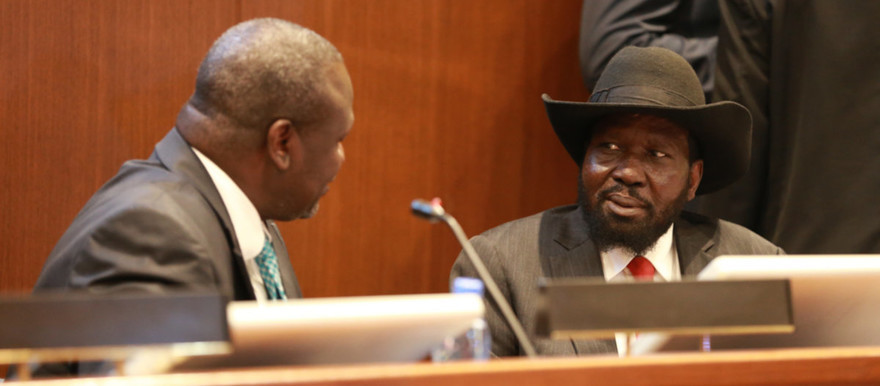Opinion: The corrupt and false notion of the Khartoum peace agreement

Attaining and sustaining the objective of the Khartoum peace agreement is going to be a near impossible feat in South Sudan because the deal is a union of South Sudanese elites to monopolize power at the expense of addressing the root causes of conflict in South Sudan. At this juncture, the key question to ask is: Do pacts between elites resolve conflict? Right now, conflict still rages in South Sudan despite the signing of the September 2018 peace agreement. To answer this question I explore the issue of elite pact peace-building during the current crisis, and why the present model of the peace process and the mentality behind it is a failure.
To better understand this phenomenon, it is important to review how widespread corruption contributes to the destruction of the state. The pattern and rate of corruption in South Sudan’s political culture has no limits whatsoever. The basis of this corruption is the political culture manifested in the deliberate undermining of institutions and poor leadership in South Sudan.
Our political culture is decayed to the extent that making peace is no more than a corrupt political opportunity for crooked South Sudanese politicians in the government and the opposition to maintain their political prestige. It is a political prestige that is attained at the expense of the people, country and those who sacrificed their lives in the country’s liberation war. And, the ingredient that promotes such a rotten culture within the country is the absence of strong government institutions in the country that would hold corrupt politicians accountable and lack of political will to fight the corruption vice.
Subsequently, top-level politicians, both in the opposition and the government are only interested in these elite pacts that offer short-term gains at the expense of addressing the reasons behind intractable conflict in the country. That is the reason SPLM-IO leader Riek Machar was willing to bail himself out of house arrest in South Africa in order to ascend to his former position of first vice president at the expense of the suffering people of South Sudan.
There was nothing to prevent him from negotiating for better terms while he was under house arrest like Nelson Mandela did while in prison. Not surprisingly, Machar signed and celebrated the so-called revitalized peace agreement in Juba with President Kiir while the people of Yei River State were being massacred on his watch. Another of the self-interested opposition politicians, Governor Joseph Bakasoro, abandoned his movement and the fight for real justice and peace because of the lure of the position of vice president stipulated in the peace agreement.
Similarly, Madame Rebecca Nyandeng’s current initiative of dragging the SPLM-G7 fellows from self-imposed exile back to Juba in order to qualify herself for the women’s vice presidency slot in the next government falls in the same vein of short-term gains that only benefit those pursuing personal glory.
Not only is the pursuit of selfish short-term gains confined to opposition politicians, but government politicians are equally complicit in this vice. Vice President Wani Igga, in an attempt to appear relevant, has engaged in tactics to lure back commanders from the National Salvation Front who hail from his Lobonok area, while knowing very well that National Salvation Front/Army (NAS ) fighters under leadership of General Thomas are engaged in the real fight for justice and equality. Meanwhile, First Vice President Taban Deng is pursuing his own self-interest by pushing for a military solution in Yei River State to boost his chances of being relevant in the contest for a position in the next government. Now, peace or the notion of seeking peace in the country has become a personal property of individual politicians who are lusting for personal incentives.
Having stated the above, it is indisputably incumbent upon us to revisit the drawing board, deconstruct the elite peace agreements, by challenging the status quo and rewiring the failed mentality driving this pursuit of self-interests by our politicians. It is suicidal to sacrifice the country for individual gain, especially when these individual politicians pride themselves as the founders of the South Sudan nation. What legacy do they want to leave behind?
Building a comprehensive South Sudanese political reconstruction program, which is people-centered should be the alternative way forward. This political reconstruction program will be the only model to guide the leaders of the country with focus on overhauling the military set-up in the country.
This alternative path demands that South Sudanese politicians sit down for talks among themselves to pursue a peace pact that is inclusive of aggrieved groups and the issues that underpin their grievances. When we still have brothers and sisters bearing arms against the state, it means we have not addressed their concerns comprehensively. This move can only be achieved by South Sudanese themselves. It will need political will and courage to achieve it. The time for that is now and not tomorrow.
The author, Oliver J. Lomeri, is a South Sudanese American political operative based in the USA. He can be reached via email: lokolumbe@gmail.com
The views expressed in ‘opinion’ articles published by Radio Tamazuj are solely those of the writer. The veracity of any claims made are the responsibility of the author, not Radio Tamazuj.